#Washington Luiz
Text

Inauguração da Confeitaria A Crystal, Na Rua Nova Esquina Com a Rua da Palma, Logo Depois Mudou de Nome Para Confeitaria Glória - Recife Em 1925, Local do Palco do Assassinato de João Pessoa, presidente da Paraíba (1928/1930) - cargo idêntico ao de Governador.
O fim trágico de 3 Joões
A tragédia que se abateu sobre a Paraíba no ano de 1930 envolveu três homens chamados João. E mudou a vida política do país na primeira metade do Século 20.
Mais um relato surge sobre esse episódio, que marcou para sempre a vida da população brasileira. Desta vez, pelas mãos da escritora pernambucana Ana Maria César, com publicação pela Cepe.
João Pessoa, presidente da Paraíba (1928/1930) - cargo idêntico ao de governador - sucedeu João Suassuna. E João Dantas, advogado e militante político, era aliado de Suassuna e fazia oposição a João Pessoa.
Quis o destino que os três Joões se cruzassem num mar de intrigas, desavenças, conflitos e mortes.
Sob o comando de João Pessoa, a Paraíba passou a conviver com uma reforma tributária que reajustou em até 80% os impostos de tudo quanto era exportado para Recife, Natal e Fortaleza. João Pessoa também baixou um decreto para desarmar os fazendeiros, acusados de acoitar pistoleiros e promover assassinatos indissolúveis. Os dois fatos levaram o coronel Zé Pereira, um dos maiores exportadores de algodão e chefe político de Princesa, a liderar uma revolta popular e decretar o município independente da Paraíba. Criou hino, bandeira e leis próprias.
João Pessoa usou a força policial do estado para combater o levante. Princesa reagiu. E o embate armado não parou mais.
A atuação profissional de João Dantas como advogado do coronel e suas declarações favoráveis à insubordinação de Princesa fizeram dele um inimigo de proa do governo paraibano. Seu escritório foi arrombado na calmaria de uma madrugada. A invasão foi atribuída pela polícia a ladrões comuns. João Dantas contestou porque desapareceram documentos confidenciais dos seus clientes e cartas íntimas trocadas entre ele e sua namorada, a professora Anayde Beiriz. A correspondência pessoal vazou.
João Dantas decidiu ir pro Recife preparar sua defesa e torná-la pública por meio de um artigo a ser publicado no Jornal do Commercio. Ao lado do cunhado, o engenheiro Augusto Caldas, foi a um hotel no Centro do Recife entregar o artigo ao amigo João Suassuna, deputado federal pela Paraíba, e pai de uma filharada, entre eles, o futuro escritor Ariano Suassuna.
Do hotel, João Dantas saiu pelas ruas do Centro da capital pernambucana. Tinha lido uma pequena notícia em jornais locais informando que João Pessoa passaria aquele 26 de julho de 1930 no Recife. Com um revólver calibre 32 nos quartos, começou a vasculhar os passos do governante paraibano, que em março daquele mesmo ano tinha disputado a vice-presidência da República na chapa de Getúlio Vargas. Enquanto era procurado por João Dantas, o governante paraibano almoçava no já tradicional Restaurante Leite. Na sua mesa, Agamenon Magalhães e o usineiro Caio de Lima Cavalcanti. De lá, o trio decidiu tomar um chá na elegante Confeitaria Glória, onde próximo estavam o carro e o motorista do Governo da Paraíba.
Foi nesse momento que João Dantas avistou o carro oficial e logo deduziu onde estava seu arqui-inimigo. Entrou na Confeitaria e disparou três tiros à queima-roupa em João Pessoa. Feridos de raspão por tiros saídos da arma do motorista, João Dantas e seu cunhado foram presos em flagrante.
A Paraíba se vestiu de luto pra chorar seu morto ilustre. Por uma decisão da família, que morava no Rio de Janeiro, e por uma conveniência política da época, o enterro foi programado para ser lá. De navio, o corpo saiu do Porto de Cabedelo para a então capital do país. Os getulistas, que não aceitavam a derrota para o paulista Júlio Prestes, usaram com maestria a comoção provocada pelo crime para apressar o projeto em curso de tomada do poder - movimento vitorioso e que ficou conhecido como “Revolução de 30”.
Nas investigações do crime, a polícia pernambucana incluiu o ex-governador paraibano João Suassuna pelo simples fato de, pouco antes de consumar o homicídio, o assassino ter deixado a cargo dele a publicação do artigo.
Ao final, nenhuma culpa foi atribuída ao chefe do clã Suassuna. Mas, isso lhe custou a vida. Pouco mais de dois meses depois daquele 26 de julho sangrento, João Suassuna tombou sem vida ao ser baleado quando passeava pelo Centro do Rio de Janeiro. Preso, o assassino disse que quisera vingar a morte de um irmão, que morrera no levante de Princesa, comandado pelo coronel Zé Pereira. O assassino acreditava que esse conflito poderia ter sido evitado pelo pai do menino Ariano Suassuna, por causa da sua amizade com o coronel. Poucos dias antes, João Dantas apareceu degolado na Casa de Detenção do Recife, ao lado do corpo do cunhado, também ferido mortalmente no pescoço. A família dos dois nunca acreditou na versão oficial de suicídio divulgada pela polícia, definia as duas mortes como assassinatos.
E assim se passaram 91 anos do trágico fim dos três Joões: Pessoa, Dantas e Suassuna.
#Política#Intrigas#Assassinatos#Mortes Políticas#João Pessoa#João Dantas#João Suassuna#Pernambuco#Paraíba#Nordeste#Getúlio Vargas#Júlio Prestes#Washington Luiz#Estácio Coimbra#Recife PE#Recife City#Rua Nova#Agamenon Magalhães#Inauguração#Assassinos#Cangaceiro Antônio Silvino#Casa de Detenção do Recife
1 note
·
View note
Text
VOA News: Luiz Ramirez: Future Role of US Troops in Afghanistan Debated
.
Source:The New Democrat
The only thing that American troops in conjunction with NATO should be doing right now is helping to train and develop the Afghan military so Afghanistan can defend itself from domestic and foreign invaders including the Taliban and other terrorists groups. We’ve been there twelve years and have our own problems back at home economically and financially. That these wars…
youtube
View On WordPress
#113th Congress#2013#Afghan Government#Afghan Military#Afghan War#Afghanistan#America#American Occupation of Afghanistan#Barack Obama#Luiz Ramirez#President Barack Obama#The White House#U.S. Congress#U.S. Government#U.S. House of Representatives#U.S. Military#U.S. Senate#United States#War on Terror#Washington#Washington DC#Youtube
0 notes
Text
Tentato golpe in Brasile: voglia di "ucrainizzazione".
Tentato golpe in Brasile: voglia di “ucrainizzazione”.
Scrivevamo due mesi fa, subito dopo la vittoria di Lula in Brasile:“La vittoria di Lula conclude un arco di eventi storici per il Sud America iniziati nei primi anni del nuovo millennio. Quel periodo carico di speranza, denominato “Socialismo del XXI secolo“, aveva visto il tentativo a “sganciarsi” di tutti i paesi dell’area dalle catene dell’imperialismo statunitense, militare ed economico. Fu…
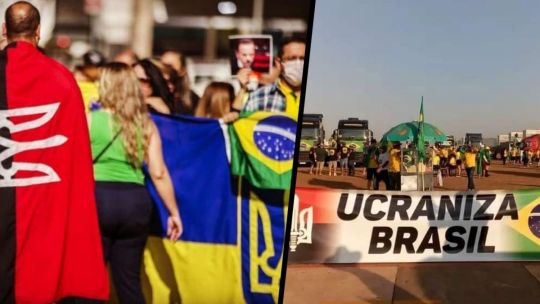
View On WordPress
#azov#battaglione azov#bolsonaro#Brasile#brasilia#capitol hill#Luiz Inácio Lula da Silva#lula#neonazismo#pravyj sektor#Stati Uniti d&039;America#washington
0 notes
Text
Brazilian Amazon Leader Urges Lula to Prosecute Bolsonaro for Genocide Against Indigenous Yamomami
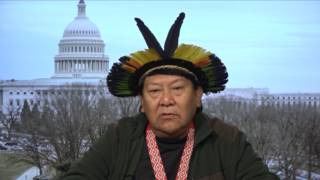
The new Brazilian government recently conducted operations to expel thousands of illegal gold miners from Indigenous Yanomami land in the Amazon rainforest. The miners have caused a humanitarian crisis among the Yanomami who have suffered from severe malnutrition and illness from illegal mining operations that have polluted rivers and destroyed forests. President Luiz Inácio Lula da Silva recently accused Jair Bolsonaro’s far-right government of committing genocide against the Yanomami people. Bolsonaro, who is expected to return to Brazil from Florida next month, could face genocide charges for his actions. Democracy Now! spoke to Davi Kopenawa Yanomami, a leader and shaman for the Yanomami people, while he was in Washington, D.C., last week. Yanomami says he supports the prosecution of Bolsonaro.
Watch the video.
#brazil#politics#brazilian politics#environmental justice#indigenous rights#yanomami people#mod nise da silveira#image description in alt
1K notes
·
View notes
Photo
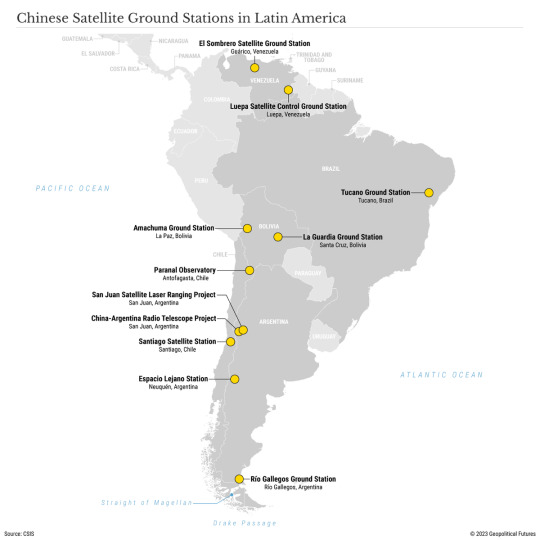
Chinese Satellite Ground Stations in Latin America
Brazilian President Luiz Inacio Lula da Silva will soon be in China to negotiate the construction of a new satellite. As the US-China rivalry heats up, Washington is sensitive to any Latin American space collaborations involving Beijing.
by @GPFutures
68 notes
·
View notes
Text
Across the globe, a diverse group of nations that view world politics differently from the United States are rising and flexing their diplomatic muscle in ways that are complicating American statecraft. From Africa to Latin America, to the Middle East and Asia, these emerging powers refuse to fit into traditional U.S. thinking about the world order. The successful pursuit of American interests in the mid-21st century calls for a strategy that attracts them toward the United States and its ideals but without expecting them to line up in lockstep with Washington.
“We refuse to be a pawn in a new cold war,” Indonesian President Joko Widodo, known as Jokowi, said in November 2022. His views are shared in some form or another by leaders of Argentina, Brazil, India, Mexico, Nigeria, Saudi Arabia, South Africa, Thailand, and Turkey. All 10 of these nations are either in the G-20 or have economies large enough to warrant membership. A majority of them have populations larger than Germany’s. Collectively, they make up around a third of the world’s population and a fifth of its economic production, while also constituting a major share of the so-called global south’s population and economic production.
In the next two decades, emerging powers like these will climb the ranks of the world’s largest economies and populations, reshaping the structure of world politics in the process. Their diplomacy is increasingly ambitious. And they are taking positions that run counter to those of the United States with growing boldness. Washington and its allies should accept not only that these powers are emerging, but also that as they grow stronger, they will not align with Washington’s preferences on many international issues, especially when it comes to Russia and China.
When Russia invaded Ukraine in February 2022, most of these powers declined to join the U.S.-led coalition to support Ukraine, refusing to take concrete action with sanctions on Russia or weapons for Kyiv. Some emerging powers, such as India and Turkey, even expanded economic ties with Russia.
Meanwhile, several of them pursued active diplomacy to end the war, challenging the U.S. policy of supporting Ukraine “as long as it takes.” Brazilian President Luiz Inácio Lula da Silva, for example, pitched a plan to assemble a peace club to end the war and urged Washington to “stop encouraging war and start talking about peace.” Separately, Jokowi visited Kyiv and then Moscow, urging Ukrainian President Volodymyr Zelensky and Russian President Vladimir Putin to start a dialogue. South Africa led a delegation of African leaders to end the war, and Turkish President Recep Tayyip Erdogan has maintained a working relationship with Putin and sought to keep diplomatic channels open.
Most of these emerging powers also have warm ties with Beijing. They are reluctant to do anything that would endanger their economic relations with China. On a visit to Beijing in 2023, for example, Lula pledged to work with China to “balance world geopolitics”—a phrase that implied upending American global primacy. Even India, which sees China as an adversary and has grown much closer to the United States in recent years, is very unlikely to back the United States militarily in the event of a war over Taiwan.
Washington thus needs to avoid the urge to frame this world historical moment as a neo-Cold War ideological struggle. When the United States appeals to the emerging powers to sacrifice their interests for the liberal world order, they suspect that it is simply trying to woo them for its hard-power struggles with Russia and China. Their officials are quick to cite the 2003 Iraq War as evidence that Washington is not so committed as it claims to the liberal international order. They point to the many cases where the United States has compromised on its high principles and backed autocrats. President Joe Biden’s support for Israel’s campaign in Gaza has only given them another reason to doubt the veracity of American claims to exceptional moral authority.
Most of these emerging powers have limited political headroom anyway for ideological struggles of the kind that so often animate U.S. foreign policy. Indian Foreign Minister S. Jaishankar drove this point home when he pointed out that Europe’s ability to wean itself from Russian energy was a luxury that India did not have. “I have a population at $2,000 [per capita annual income],” he said. “I also need energy, and I am not in a position to pay high prices for oil.”
Given frictions between Washington and so many emerging powers of late, it can be tempting to disregard them and focus solely on countering Beijing and Moscow. But this would be a mistake. The emerging powers don’t pose a threat of the kind that U.S. adversaries can, but they also can’t just be ignored. China and Russia are certainly not going to ignore them—in fact, they are actively courting their leaders for political ties and market access with the hope of building a network of political and economic partners to obviate the need for ties to the West.
The emerging powers are also very open to China’s backing for alternative international institutions, such as the BRICS New Development Bank, that offer the prospect of infusions of capital without the bothersome conditions that accompany Western loans. They are critical of many aspects of the U.S.-led international order, which they see as dominated by former colonial powers and unfairly structured to serve the interests of the world’s wealthiest nations.
The good news for Washington is that the emerging powers don’t want to be vassals of China any more than they want to be vassals of America. They are not swing states ready to pick sides in a neo-Cold War. In fact, they actively seek a more fluid and multipolar world, one in which they believe they will have more leverage and freedom of maneuver. Many, moreover, maintain closer economic ties with the United States than China, especially when it comes to investment and defense cooperation.
Washington can make progress with these powers if it puts aside grand ideological framings about the liberal world order and focuses on developing a positive value proposition that offers meaningful benefit to their economic and political development, sovereignty, and aspirations for an enhanced voice in international affairs.
Although trade agreements have become politically unpopular for Republicans and Democrats alike, market access remains a powerful tool the United States has to this end. Other mutually beneficial economic arrangements are imaginable, focused on specific sectors and packages. So is cooperation on infrastructure investments, technology manufacturing, energy transition initiatives, deforestation, public health, and other areas.
Even when making progress on common interests, the emerging powers will also maintain substantial relationships with U.S. adversaries. Washington should not fall into the trap of judging the quality of its relations with the emerging powers by the strength of their ties to China or Russia.
Ultimately, the best way to engage with these nations is to help them strengthen their sovereignty so that they can resist the influence of U.S. adversaries and gain a real stake in sustaining a peaceful world order. This will take time and a change of approach but is likely to pay long-term benefits to America’s prosperity and continued global leadership.
7 notes
·
View notes
Text
Minha mulher que ordenou que eu ajudasse.
By; Carlos
Ola, me chamo Carlos, sou carioca, nascido e criado no Rio de Janeiro, tenho 34 anos, sou casado, tenho 1.72 de altura, 69 quilos, cabelos pretos, sou funcionário público e Militar.
Bom, esta história começou a mais ou menos um mes e meio. Passei num concurso público na cidade do RJ, e comigo entrou também mais cinco amigos e uma amiga e que passamos a ficar muito unidos e confidentes.
Sempre fui muito brincalhão e me sentia feliz. Isso me traz muitas amizades e percebo que as pessoas gostam disso.
Com o passar do tempo, percebia que minha amiga Simone não tinha tanta alegria. Via tristeza em seu olhar e como já conversávamos muito, um dia perguntei se ela tivesse com problemas, eu estaria ali para ajudar.
Disse ser casada há 6 anos, que amava o marido, mas não era satisfeita sexualmente. Ele não gostava de inovar, era só o básico.
Perguntou como eu era com minha esposa… disse que era muito bom, minha esposa adorava inventar na hora e já havia feito praticamente de tudo que se imagina. Percebi e senti uma ponta de inveja dela…
Fui para casa pensativo. Admito que tinha vontade de ajudá-la de verdade, afinal ela era muito gostosa. Tinha um corpo mulato todo trabalhado na academia.
Minha esposa percebeu que eu estava muito pensativo e me perguntou o que houve. Falei com ela sobre o assunto. Para minha surpresa, minha esposa me perguntou se eu gostava dela como amiga. Disse que ela é superlegal e falou então:
- “ajuda a ela saber o que é prazer”!
Nossa… Naquela hora peguei minha esposa e transamos feitos loucos.
No dia seguinte chamei Simone para almoçar e conversamos sobre o assunto. Disse que gostaria de ajudá-la, ela ficou assustada e disse não querer atrapalhar meu casamento e nem queria se separar pois ama o marido. Tranquilizei-a, dei um beijo nela e fomos para o trabalho novamente.
No outro dia ela veio falar comigo. Não parou de pensar em mim e que estava louca de tesão. Arrumamos um jeito e saímos mais cedo do trabalho, neste dia ela veio com uma saia que não havia quem não olhasse. Saímos na hora do almoço.
Quando estava no carro, passei a mão por de baixo da saia dela e senti a calcinha já encharcada. Coloquei sua mão em mim… Ela ficou doida e disse:
- “caramba, você é pequeno só na altura!”
E partimos para um motel na Washington Luiz. Chegando no quarto, ela não perdeu tempo, me beijou loucamente, logo desceu minha calça e me abocanhou inteiro. Fez isso com tanta gula que não aguentei e gozei na sua boca.
Não se fez de rogada, tomou todo o leite e me limpou com a língua. Levei-a para a cama e tirei a roupa dela. Que mulher durinha! Beijei seu corpo, passeei com a língua em cada centímetro de seu corpo. Ficou doida quando desci… Ela gemia sem parar, se contorcendo toda. Mexia meus dedos nela…
Quando senti o gozo dela em minha boca, suguei aquele líquido. Penetrei-a com força logo em seguida. De lado, de costas, por cima… fiz um trabalho quase completo. Ela disse ter gozado pelo menos umas três vezes… Então, gozei novamente, só que desta vez foi dentro dela.
Caímos cansados, esperamos por alguns minutos… mas eu queria algo mais. Não sabia se iria ter outra oportunidade com ela… Sei lá, quem sabe bate uma crise de consciência…
Logo comecei a beija-la novamente, vendo se entregar completamente. Disse que queria o “algo mais” dela, que disse que tinha medo pois ele era virgem.
Já tinha tentado dar para o marido, mas ele brigou com ela, na hora da transa temos que dar e receber prazer, essa é minha opinião. Houve pequenos protestos do tipo;
- “você vai me rasgar, isso é muito grande”.
Olhei em seus olhos como se falasse” confia em mim” e a virei de costas. Deixei-a totalmente molhada novamente e com meu dedo comecei a preparar “minha entrada”. Ela já se contorcia outra vez.
Coloquei outro dedo, depois outro, fazendo movimentos lentos. Coloquei devagarzinho até entrar tudo… Que delícia!
A princípio, seus gemidos eram de dor, mas logo foram tomados pelo prazer. Gritava muito!
– Quer que eu tire? – perguntei malicioso.
Se eu tirasse, “ela me matava” (risos) foi sua resposta. Coloquei com mais vontade até gozarmos juntos.
Caímos esgotados na cama. No banho, tentei mais uma vez… mas ela disse que não aguentava mais, estava muito ardida, que nunca fizeram isso com ela. Eu queria aproveitar tudo, afinal não saberia se ela iria me querer novamente…
– Você está doido? – ela disse. – Agora é meu macho. Tenho um marido que amo e um macho que me satisfaz. Sua mulher é muito sortuda.
Fomos embora. Quando cheguei em casa, contei à minha esposa que “ajudei” minha amiga. Ela quis saber tudo e contei…
– Agora repita tudo comigo! – minha esposa ordenou.
Nunca “trabalhei” tanto!
Outro dia conto a história de quando minha esposa quis ter a Simone junto comigo. Foi incrível! Amo minha mulher!
Enviado ao Te Contos por Carlos
26 notes
·
View notes
Text
Semi-sacanagem, rsrs

Esta é a Praça Gabriel de Rubens Nolam, no Bom Retiro.
(EDIT - Postagem escrita antes do dia em que descobrimos o nome dessas luminárias - X-90 e X-250)
Antes, aí era um depósito da prefeitura que guardava a antiga iluminação pública da cidade que estava sendo substituída entre os anos 90 e 10 - luminárias de alumínio fundido para lâmpadas de vidro (como as antigas luminárias da Av. Paulista, Marginal Tietê e diversos outros locais públicos de São Paulo).

(Imagens Google Street View, não estão na mesma escala. A X-250 tem 4 lâmpadas por lado, a X-90, duas. E o Batman já tá dando dislike!)
As luminárias, a maioria delas, eram da empresa Peterco, uma empresa mal documentada na Internet, a única coisa que existe diretamente em nome deles é um site "em construção" de aparentemente antes deles fecharem (EDIT - Era uma empresa de Goiás tentando reviver a marca, a Peterco fechou as portas em 1991 e ao que tudo indica a empresa era de São Paulo, mesmo. A Peterco também fazia semáforos de alumínio fundido, que em 1996 caíram fora e deram lugar a semáforos de policarbonato.)
Sim, todas as luminárias da Peterco eram X algum número - e mesmo com 3 e 2 pétalas. Eike Batista, você teve algo a ver com isto?!...
Inclusive, é por isso que no exterior a iluminação pública parece tão diferente da nossa. Estamos contemplando produtos 100% nacionais. No exterior é raro usarem postes altos como esses aí (cerca de 20 a 35 metros).
Existem apenas alguns anúncios de revistas em preto e branco (dizendo que eles fizeram a iluminação da Av. Paulista e do Minhocão), fora o que eu mesmo li nos anúncios de lista telefônica. A matéria prima deles era alumínio fundido, o que em 1969 (há fotos desse ano de São Paulo já com luminárias deles) devia ser sensacional - e hoje é um elefante, as luminárias mais recentes das cidades por aí, um pouco antes de os LEDs tomarem conta, eram de plástico e alumínio repuxado - tipo uma 'casquinha' de alumínio.
Ao que tudo indica, cada 'pétala' dos postes tinha mais ou menos 1 metro (baseando-se no tamanho das lâmpadas, 28.5 cm de comprimento para uma 400W de mercúrio, e na X-90 ficavam duas frente a frente, com algum espaço entre elas).
Daí a sensação que eu tenho hoje em dia, com as Cobrahead e agora com as LEDs, de olhar pra cima e parece que não tem nada iluminando a rua...

Aqui uma única sobrevivente na região do parque do Ibirapuera e que eu acho que já já vai cair... está abrindo uns rasgos entre a parte triangular, onde ficam os reatores, e a retangular (a Av. Washington Luiz era coalhada dessas, de 2 pétalas)

Uma curiosidade que só este blog mostra: essas luminárias já foram vistas na quadra da Mangueira (até 2011), e na Igreja O Brasil Para Cristo, em São Paulo. Locais antagônicos, rsrs
2 notes
·
View notes
Text
Wednesday, January 3, 2024
Less sustainable
(NYT) The federal debt starts the new year at a level that is hard to grasp: $34 trillion. That is 1.2 times the U.S.’s annual economic output. Both parties have contributed to the situation. Republicans have passed large tax cuts. Democrats have enacted ambitious climate and health care initiatives. Both funneled money to Americans in response to the Covid pandemic. For years, many economists believed the country’s debt was not a problem. But times have changed, and federal deficits now look scarier. In November, the financial firm Moody’s lowered its outlook on U.S. debt from “stable” to “negative.” The solution remains unclear. And the economy may be able to continue growing at a steady clip for years despite the debt. At some point, though, the federal government will likely need to raise taxes and cut spending in ways that many Americans will find unpleasant.
Biden and Trump are poised for a potential rematch that could shake American politics
(AP) U.S. presidential elections have been rocked in recent years by economic disaster, stunning gaffes, secret video and a pandemic. But for all the tumult that defined those campaigns, the volatility surrounding this year’s presidential contest has few modern parallels. In the coming weeks, the high court is expected to weigh whether states can ban former President Donald Trump from the ballot for his role in leading the Jan. 6, 2021, insurrection at the U.S. Capitol. Meanwhile, a federal appeals court is weighing Trump’s argument that he’s immune from prosecution. The maneuvers are unfolding as prosecutors from New York to Washington and Atlanta move forward with 91 indictments across four criminal cases involving everything from Trump’s part in the insurrection to his efforts to overturn the 2020 election and his hush money paid to a porn actress. On the Democratic side, President Joe Biden is seeking reelection as the high inflation that defined much of his first term appears to be easing. But that has done little to assuage restless voters or ease widespread concerns in both parties that, at 81, he’s simply too old for the job.
Maine Secretary of State Targeted by ‘Swatting’ After Trump Ballot Decision
(NYT) Maine’s secretary of state was the victim of a “swatting” call to her home, the authorities said, the latest politician to be targeted in recent weeks by people reporting fake crimes to the police, hoping to provoke heavily armed responses. A hoax call was placed on Friday night, just a day after the secretary of state, Shenna Bellows, barred Donald J. Trump from the state’s ballot, a politically fraught decision that drew criticism from Republicans across the country. The state police said that in the call, a man claimed to have broken into Ms. Bellows’s home in Manchester, just outside the capital city of Augusta. State troopers searched the residence, but did not find anything suspicious. Swatting incidents have risen in recent years, and advances in technology have made it easier for perpetrators to make 911 calls sound more credible. In the days before the hoax call against Ms. Bellows, numerous other high-profile politicians said swatters had targeted their homes.
Brazil’s economy improves during President Lula’s first year back, but a political divide remains
(AP) Brazilian President Luiz Inácio Lula da Silva likes to boast he had a good first year after returning to the job. The economy is improving, Congress passed a long-overdue tax reform bill, rioters who wanted to oust him are now in jail, and his predecessor and foe Jair Bolsonaro is barred from running for office until 2030. Still, the 78-year-old leader has struggled to boost his support among citizens and lawmakers. Some major setbacks, including a series of votes by Congress to override his vetoes, signaled that Lula’s future could be less productive in a Brazil almost evenly split between his supporters and Bolsonaro’s. “Brazil’s political polarization is such that it crystallized the opinions of Lula and Bolsonaro voters beyond the economy,” said political consultant Thomas Traumann, the author of a recent best-selling book on Brazil’s political divisions. “These groups are separated by very different world views, the values that form the identity of each group are more important than food prices or interest rates.”
British fish and chips is endangered
(NBC News) Ever since she was old enough to walk, Terrilea Coglan was climbing aboard fishing boats that set sail each morning from the rocky beachfront of Hastings to harvest the key ingredient in Britain’s most iconic dish: fish and chips. The day’s catch travels just a short way from the boats up to the seaside fish and chips shops, or “chippies,” that pride themselves as much in the freshness of the fish as in the secret recipes for their gooey batter. Now, all along the British coast, towns like Hastings are being squeezed by a cost-of-living crisis that’s hit the supply chain behind fish and chips, pushing up prices beyond what some are willing to pay for a humble, if comforting, weeknight meal. The cost of diesel to power the fishing boats, the sunflower oil to fry the fish and the electricity to run the friers have all skyrocketed. The high prices are threatening a billion-dollar business and a staple of the British menu: Every year, Brits eat more than 382 million orders of fish and chips, the federation says.
Heavy Russian missile attacks hit Ukraine’s 2 largest cities
(AP) Ukraine’s two largest cities came under heavy Russian missile attacks on Tuesday, killing one person and injuring dozens. Oleh Syniehubov, the governor of the Kharkiv region, said one person died and 41 were injured in Russian missile strikes that hit the center of Kharkiv city and other areas. In Kyiv, the capital, five areas of the city were hit in the strikes and at least 12 people injured, according to mayor Vitali Klitschko. The barrage of the cities continued Russia’s escalated attacks on Ukraine in recent days that began on Friday with its largest single attack on Ukraine since the war started, in which at least 41 civilians were killed.
Myanmar’s ‘watermelons’: Soldier on the outside, rebel inside
(Reuters) For about two years, says 24-year-old Yan, a former Myanmar police officer, he risked his life pretending to serve the military junta while secretly spying for the armed resistance. “I freed myself from unfair orders,” he told Reuters from a room in a town near the Myanmar border where he said he was taking refuge after fleeing the country in April. Opposition groups said it was difficult to determine how many members of the security forces supplied information to the resistance, and their number was likely small given the risk, but they play a crucial role. They have supplied intelligence, including about the transportation of military supplies, that has helped opposition groups plan attacks, a spokesperson for People’s Goal, a group that supports defectors, told Reuters. Sources inside the security forces are known in Burmese as “watermelons”—green on the outside, appearing loyal to the army, but red, the colour of the ousted National League for Democracy government, on the inside.
China Is Pressing Women to Have More Babies. Many Are Saying No.
(WSJ) Chinese women have had it. Their response to Beijing’s demands for more children? No. Their refusal has set off a crisis for the Communist Party, which desperately needs more babies to rejuvenate China’s aging population. With the number of babies in free fall—fewer than 10 million were born in 2022, compared with around 16 million in 2012—China is headed toward a demographic collapse. China’s population, now around 1.4 billion, is likely to drop to just around half a billion by 2100, according to some projections. When Beijing said it would abolish its 35-year-old one-child policy in 2015, officials expected a baby boom. Instead, they got a baby bust.
South Korean opposition leader is stabbed in the neck by a knife-wielding man
(AP) South Korea’s tough-speaking liberal opposition leader, Lee Jae-myung, was stabbed in the neck by an unidentified knife-wielding man who attempted to kill him during his visit to the southeastern city of Busan, police said. Lee, 59, the head of the main opposition Democratic Party, was airlifted to a Seoul hospital for surgery after receiving emergency treatment in Busan. Police and emergency officials earlier said he was conscious after the attack and wasn’t in critical condition, but his exact status was unknown.
Planes collide and catch fire at Japan’s busy Haneda airport, killing 5
(NYT) A Japan Airlines flight carrying 367 passengers and 12 crew members collided with a Japan Coast Guard aircraft today while landing at an airport in Tokyo. The crash killed five Coast Guard members and caused the passenger jet to burst into flames. But the airline said that every person on the Japan Airlines plane was able to evacuate to safety. “The crew was spectacular in their reaction times,” one aviation expert said. “It really is a miracle.” The Coast Guard members had been en route to deliver supplies to the region affected by the powerful earthquake that struck western Japan yesterday, killing at least 55 people.
The U.S. and Israel: An Embrace Shows Signs of Strain After Oct. 7
(NYT) No other episode in the past half-century has tested the ties between the United States and Israel in such an intense and consequential way. The complicated diplomacy between Washington and Jerusalem since Hamas terrorists killed 1,200 people and seized 240 hostages has played out across both governments, in direct interactions between the leaders and intense back and forth between military and intelligence agencies. The relationship has grown increasingly fraught as Mr. Biden has involved himself more intensely in the conflict than almost any other issue in three years in office. Mr. Biden has seen growing internal resistance to his backing of Israel, including multiple dissent cables from State Department diplomats. In November, more than 500 political appointees and staff members representing some 40 government agencies sent a letter to Mr. Biden protesting his support of Israel’s war in Gaza. Congressional Democrats have been pressing him to curb Israel’s assault, and the United States has found itself at odds with other countries at the United Nations. The friction appears to be coming to a head as the new year arrives. The Biden team recognizes that its challenge is not just Prime Minister Benjamin Netanyahu, since Israelis across the board support the military operation that according to the Gaza Health Ministry has killed more than 20,000 people. But there is no serious discussion inside the administration of a meaningful change in policy, like cutting off the arms supply to Israel.
Ethiopia signs pact to use Somaliland’s Red Sea port
(Reuters) Landlocked Ethiopia signed an initial agreement with Somalia’s breakaway region of Somaliland on Monday to use its Red Sea port of Berbera, Prime Minister Abiy Ahmed’s office said. The Horn of Africa country currently relies on neighbouring Djibouti for most of its maritime trade. President Abdi said as part of the agreement, Ethiopia would also be the first country to recognise Somaliland as an independent nation in due course. Somaliland has not gained widespread international recognition despite declaring autonomy from Somalia in 1991. Somalia says Somaliland is part of its territory.
Books
(YouGov) A new poll found that 46 percent of Americans did not read a book in 2023 as of a December 16-18 poll. Overall, 26 percent of respondents reported reading between one and five books, 10 percent somewhere between six and 10 books, 8 percent between 11 and 20 books, and 11 percent more than 20 books so far. Indeed, the most active readers are reading a whole lot of books: 6 percent of respondents said they read over 40 books, a truly impressive stack.
2 notes
·
View notes
Link
Lula and Bolsonaro can have a duel in a Jacksonville Publix parking lot
10 notes
·
View notes
Text
A Polícia Rodoviária Federal apreende carregamento com armas e drogas na Baixada Fluminense
OIPOL & OIJUST Operando no Brasil / Comunicação da Polícia Rodoviária Federal (#PRF). 29/04/2024
PRF apreende carregamento com armas e drogas na Baixada Fluminense
Fuzis, pistolas e 750 quilos de maconha
A Polícia Rodoviária Federal (PRF) apreendeu um carregamento com fuzis, pistolas e mais de meia tonelada de maconha. O flagrante aconteceu na Rodovia Washington Luiz (BR-040), na Baixada…

View On WordPress
0 notes
Text
Breaking Ice, and Helicopter Drops: Winning Photos of Working Scientists
Nature’s Annual Photography Competition Attracted Stunning Images From Around the World, Including Two Very Different Shots Featuring the Polarstern Research Vessel.
— By Jack Leeming | 23 April 2024
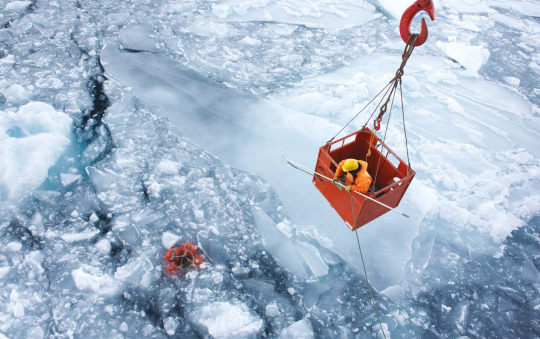
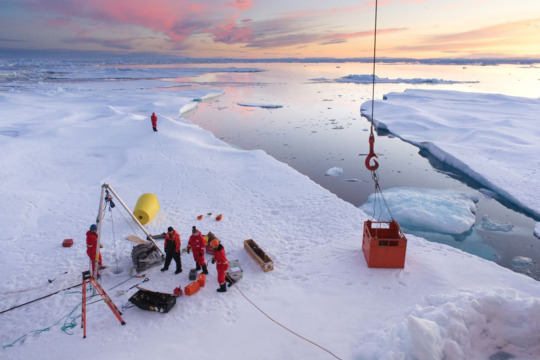
Glaciologist Richard Jones captured the moment a crew member on RV Polarstern prepared to rescue a measuring device trapped in ice.
Nature’s Annual Photography Competition Showcases Stunning Images From Around the World. By Jack Leeming. This image, taken on top of the ice breaker research vessel Polarstern, shows the delicate process of retriev ing an instrument called a CTD (short for conductivity, temperature, depth) that had become trapped under sea ice off the coast of northeastern Greenland. CTDs, which are anchored to the sea floor, measure how ocean properties such as salin ity and temperature vary with depth. At some point, the sea ice had closed over the top of this one, forcing the Polarstern to skirt carefully around the equipment, breaking the ice to rescue it from the freezing ocean.
“You’re crashing into ice and breaking through it. So it wasn’t particularly calm sail ing for the majority of the trip,” remembers Richard Jones, who took the image in Septem ber 2017 and is the winner of Nature’s 2024 Working Scientist photography competition. His research aims to improve estimates of the rate at which ice is being lost from the world’s glacial ice sheets. Jones, a glaciologist at Monash University in Melbourne, Australia, highlights the photo graphic contrast between icebreaker and ice that he’d become used to in his five weeks aboard the Polarstern. “All you really see is
blue and white. And sometimes that might feel pretty monotonous, but the colours from the CTD instrument and the orange of the crane contrast the scene and also complement it quite nicely.” We received more than 200 entries this year from researchers working around the world. The winner and the four runnersup (highlighted on the following pages) were selected by a jury of Nature staff, including three of the journal’s picture editors. All will receive a prize of £500 (US$620), in the form of Amazon vouchers or a donation to charity, as well as a year’s subscription to Nature.
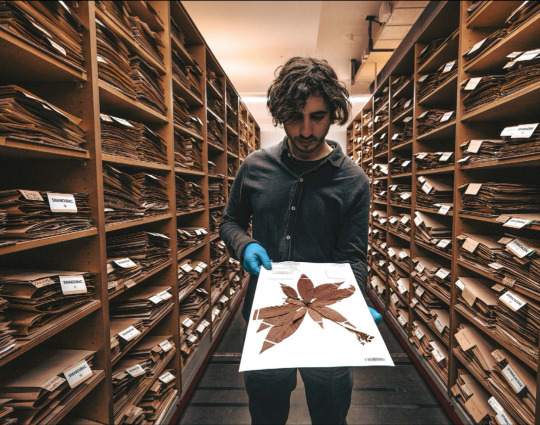
Work/Careers! Library Ofleaves! PhD student Kim Castro took this photo of her colleague, postdoctoral researcher Luiz Leonardo Saldanha, in a herbarium that they both work in regularly. It's shared between the University of Zurich and the Swiss Federal Institute of Technology (ETH) in Zurich. Both Castro and Saldanha investigate the medicinal plants of the Amazon at the Department of Systematic and Evolutionary Botany at the University of Zurich, although the two have very different approaches: whereas Saldanha investigates their chemical diversity, Castro looks at how the plants are perceived by Indigenous communities in the Amazon, specializing in how the plants smell. A herbarium, Saldanha says, is "like a library - but instead of books, there are plants here". Saldanha posed with this particular sample (Palicourea corymbifera, collected in 1977) because it comes from his home country, Brazil, but is used by the Indigenous Desano people in Colombia as a medicinal herb. "So it creates a commonality between South American countries," he says.

“Only 130 of These Birds 🦅 Remain On Earth. A Single Mosquito Bite Can Kill a Kiwikiu." Reaching the beak Conservation biologist Ryan Wagner snapped this photo of field biologist Sonia Vallocchia feeding a recently caught kiwikiu (Pseudonestor xanthophrys), in January this year. It was taken on Haleakala volcano on the Hawaiian island of Maui. Wagner, a PhD student at Washington State University Vancouver, was on an expedition to the island as a science communicator, hoping to raise awareness of the plight of the endangered birds. "Only 130 of these birds remain on Earth," explains Wagner. "Their numbers have crashed due to avian malaria, which is spread by invasive mosquitoes. As climate change warms the island, mosquitoes have advanced upslope into the high-elevation refuges where native birds survive. A single mosquito bite can kill a kiwikiu." He hopes that ornithologists such as Vallocchia, who works for the Maui Forest Birds Recovery Project in Makawao, will help to save these birds by bringing some of them (by helicopter) to the Maui Bird Conservation Center, also in Makawao. There, they will be treated for malaria and join a captive breeding programme, he says.

Mountain Drop-off! In this dramatic image, taken from below the still-spinning, deafening blades of a military helicopter, scientists shelter with their equipment after being dropped off at the top of a remote mountain in northern Amazonia. They are taking part in a biodiversity-research expedition to Serra Imeri, an isolated mountain range that rises through the forest canopy near the border of Brazil and Venezuela, in November 2022. "A total of 14 scientists and dozens of military support personnel took part in the expedition, which lasted for 11 days and resulted in the discovery of several new species of amphibians, reptiles, birds and plants," says photographer Herton Escobar, a science journalist who works with the scientists pictured, at the University of São Paulo in Brazil.

Go With The Floe! Emiliano Cimoli, a remote-sensing scientist at the Institute for Marine and Antarctic Studies at the University of Tasmania, Australia, took the second photograph featuring the research vessel Polarstern in this year's collection of winning images. Here, Carolin Mehlmann and Thomas Richter, mathematicians at the University of Magdeburg, Germany, are measuring the depth of snow across a giant ice floe drifting in the middle of the Arctic Ocean. The image was taken during a two-month voyage organized by the Alfred Wegener Institute, based in Bremerhaven, Germany, in August 2023. The goal of the expedition was to evaluate interactions between the ice physics, biology, hydrography, biogeochemistry and biodiversity of the Arctic ecosystem, from the sea ice to the sea floor.
#Nature.Com#Nature’s Annual | Photography | Competition#Stunning Images | Around the World 🌎#Polarstern Research Vessel 🚢#Winning Photos#Working Scientists
0 notes
Text
Brazil's Lula, Venezuela's Maduro embrace 'new era' in ties
Venezuelan leader Nicolas Maduro met with leftist Brazilian President Lula ahead of a regional summit in Brasilia. Lula's conservative predecessor, Jair Bolsonaro, had previously banned Maduro from entering Brazil.
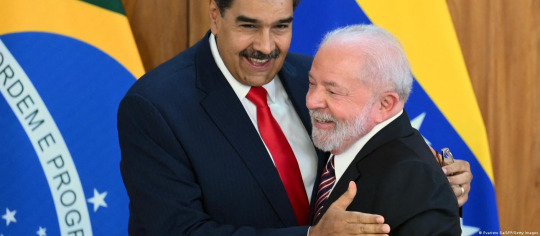
Brazilian President Luiz Inacio Lula da Silva met his Venezuelan counterpart Nicolas Maduro on Monday and called out US sanctions against Venezuela as "extremely exaggerated."
Maduro, who is seen as a controversial leader internationally, met Lula on his visit to Brazil. Maduro was greeted by Lula with a hug and back-slap in the presidential palace of Brasilia.
The Venezuelan leader was invited by Lula to attend a South American leaders' summit that will be held on Tuesday to discuss the revival of the Union of South American Nations (UNASUR).
Lula criticized the US for denying legitimacy to Maduro's socialist government, which is viewed by Washington as authoritarian for alleged human rights violations.
Lula chided the US over denial of legitimacy to Maduro's government and the "900 sanctions" Venezuela faces.
Continue reading.
#brazil#venezuela#politics#brazilian politics#venezuelan politics#luiz inacio lula da silva#nicolas maduro#international politics#foreign policy#mod nise da silveira#image description in alt
242 notes
·
View notes
Text
Sem a declaração de uma guerra total entre Irã e Israel, os mercados adotam certo alívio nesta segunda-feira, mas sem abandonar a postura de alerta, enquanto aguardam indicadores econômicos e discurso do presidente do Federal Reserve (Fed, o banco central americano), Jerome Powell, entre outros dirigentes da instituição, do Banco Central Europeu e do Banco da Inglaterra. As reuniões de Primavera do FMI e do Banco Mundial, em Washington, ficam no centro das atenções, além de balanços trimestrais, como dos bancos Goldman Sachs e Bank of America (BofA) e das empresas United Health, Netflix e TSMC, a gigante de semicondutores de Taiwan. No Brasil, a equipe econômica divulga hoje o projeto de Lei de Diretrizes Orçamentárias (PLDO) de 2025 e o presidente Luiz Inácio Lula da Silva lança programas para estimular o mercado de crédito e os assentamentos de agricultores. O presidente do Banco Central, Roberto Campos Neto, faz palestra em Nova York. Ainda nos próximos dias são esperados o IGP-10 e o IBC-BR.
Exterior
Sinais de que Irã e Israel evitam entrar em conflito direto, após os ataques iranianos lançados contra território israelense no fim de semana, abrem espaço para queda dos contratos futuros do petróleo nesta segunda-feira, com o barril do Brent abaixo de US$ 90, embora na semana passada tenha acumulado queda de 0,79%, diante da resiliência da inflação dos EUA, após dados do Índice de Preços ao Consumidor (CPI) americano em março surpreenderem para cima. Sem uma escalada no conflito no Oriente Médio, os juros dos Treasuries sobem, após caírem na sexta-feira por aversão a risco, e os índices futuros das bolsas de Nova York sugerem recuperação, enquanto o dólar recua ante euro e libra com investidores na expectativa por dados econômicos americanos hoje, incluindo as vendas no varejo, balanço trimestral do Goldman Sachs e comentários de dirigentes do Federal Reserve (Fed, o banco central americano).
Na sexta, em meio à tensão geopolítica, a chance de corte de juro pelo Fed até julho voltou a ser majoritária (54,3%). Na Europa, não há uma direção única nas Bolsas, com investidores acompanhando os desdobramentos do conflito entre Irã e Israel e após o resultado da produção industrial da zona do euro, que subiu 0,8% no confronto mensal de fevereiro, como era previsto, após cair 3% em janeiro. Na Ásia, a bolsa chinesa de Xangai driblou o mau humor na região e subiu mais de 1%, reagindo à divulgação das novas diretrizes de Pequim para os mercados de capitais que enfatizam a proteção a investidores. Porém, a bolsa de Shenzhen caiu à medida que o banco central chinês, conhecido como PBoC, manteve a taxa da linha de empréstimo de médio prazo em 2,5%, sugerindo que seus juros principais também ficarão inalterados.
Brasil
A melhora do humor em Nova York e medidas chinesas de proteção a investidores em ações podem apoiar uma recuperação do Ibovespa, após cair aos 125.946,09 pontos (-1,14%) na sexta-feira, a menor cotação desde 7 de dezembro e acumulando perda semanal de 0,67%. A valorização de 2,18% do minério de ferro também é notícia positiva para os papéis da Vale, mas a queda do petróleo serve de contraponto e deve pesar em Petrobras em meio a notícias relacionadas ao conselho de administração da estatal. Contudo, a elevação dos rendimentos dos Treasuries tende a puxar a curva de juros futuros e limitar os ajustes das ações, enquanto o dólar mais fraco frente euro, libra e divisas emergentes pares do real sugere alívio ao mercado de câmbio, onde o dólar à vista subiu até R$ 5,1482 na sessão anterior, mas fechou aos R$ 5,1212 (+0,60%), com salto na semana de 1,10%.
No radar hoje fica o Projeto de Lei de Diretrizes Orçamentárias (PLDO) de 2025 e a expectativa é para a mudança da meta fiscal a ser seguida no próximo ano prevista no novo arcabouço fiscal – que é de um superávit de 0,5% do Produto Interno Bruto (PIB). Discussões apontam até agora para um número entre resultado primário zero e superávit de até 0,25% do PIB – repetindo a meta estipulada para este ano.
O governo federal tem visto a agenda focada em aumento de arrecadação federal perder força daqui para frente.
Leia também
*Agência Estado
Link da matéria
0 notes
Text
Lula Aims High
When former—and now incoming—Brazilian President Luiz Inácio Lula da Silva took to the podium in São Paulo on Sunday night following his razor-thin election victory over incumbent President Jair Bolsonaro, he first stressed that he would govern for all Brazilians. Then he proceeded to speak extensively about foreign policy.
In his recent international travels, Lula said, “What I hear the most is that the world misses Brazil. They miss that sovereign Brazil that talks to the richest and most powerful countries like an equal and at the same time contributes to the development of poorer ones.”
Lula alluded to his role in past efforts to integrate South America and Latin America by strengthening customs union Mercosur and the now-defunct regional organ Unasur; carry out technical cooperation with African countries; and create the BRICS grouping of Brazil, Russia, India, China, and South Africa. Going forward, he pledged to work for fairer international trade, take an active role in fighting the climate crisis, and campaign for including more countries as permanent members of the U.N. Security Council. Brazil has for decades sought a permanent seat on the council.
Celso Amorim, Lula’s foreign minister during his 2003 to 2010 presidency, has often described Lula’s foreign policy of that period as “tall and active”: Brazil opened 35 new embassies and launched new cooperation initiatives with countries including the United States, Iran, and Russia. Amorim remains Lula’s top foreign-policy advisor and stood near him on stage on Sunday; he is expected to continue to advise Lula on foreign policy in the new administration.
But the world has changed dramatically since the two were last in office: Sharp geopolitical tensions between Washington and both China and Russia make Brazil’s previous constellation of alliances more difficult to maintain, and Brasília’s global standing has also diminished dramatically under Bolsonaro. Still, Lula appears set to try to resurrect his wide-ranging foreign policy.
In an early sign of goodwill, Lula received a stream of congratulations from the leaders of countries including the United States, France, and Australia in the minutes after his election victory was confirmed. In at least the U.S. case, Reuters reported that the quick recognition was an effort to stave off any potential attempt by Bolsonaro to contest the election result. Bolsonaro’s chief of staff said Tuesday that the administration had agreed to a transfer of power, but some of the president’s supporters have continued to demonstrate against the election results.
In his calls with foreign leaders such as U.S. President Joe Biden, Lula has emphasized climate cooperation. He pledged in his victory speech to reach zero deforestation and, according to Reuters, has been in talks with authorities in Indonesia and the Democratic Republic of the Congo about creating a global alliance for forest protection since before his victory. Norway and Germany have already signaled they plan to unblock environmental aid that they froze over Bolsonaro’s poor climate record. The president of Lula’s Workers’ Party also said Lula will attend next week’s U.N. climate conference in Egypt; Bolsonaro, who presided over soaring deforestation in the Amazon, had not announced plans to attend by Thursday.
In an interview in the September/October issue of Nueva Sociedad, Amorim waded into today’s thornier foreign-policy topics, offering clues as to how Lula may navigate them in office. He expressed a nonaligned position on U.S.-China tensions. On trade—with both China and the European Union—Amorim said Latin American countries should push for guarantees that help local industry. He also emphasized the threat of nuclear weapons use in Russia’s war in Ukraine; in a separate interview, Amorim supported negotiations to end the conflict and said BRICS members could back them.
Latin American countries should especially work to strengthen their ties with Europe, Amorim said, calling the continent “very important in the multipolar game.” As a starting point, it now appears far more likely that a long-stalled trade agreement between the EU and Mercosur—paused in part over concerns about Bolsonaro’s environmental record—will be approved.
Amorim has stressed that Latin American integration is crucial to Lula’s foreign-policy doctrine. True to form, Lula’s first in-person meeting with a head of state as president-elect was with Argentine President Alberto Fernández on Monday. “I want to give him the hug he deserves,” Fernández said, calling Lula a “leader in the region.”
Upcoming Events
Sunday, Nov. 6, to Friday, Nov. 18: Lula and the presidents of Latin American countries such as Colombia are due to participate in the COP27 climate conference in Egypt. Former Grenadian environment minister Simon Stiell is the United Nations’ lead climate negotiator.
Sunday, Nov. 20: The FIFA World Cup begins in Qatar. We’ll be covering Latin American soccer teams’ trials and tribulations in this newsletter.
What We’re Following
Ecuador’s security crisis. Ecuadorian President Guillermo Lasso was supposed to travel to the United States this week on the heels of the announcement on Tuesday of a new fair trade working group between Quito and Washington. Although it’s short of the full-blown trade deal that Ecuador sought, both sides say that agreeing to new trade regulations could increase business between the two countries. The countries have not publicly spoken about the specifics of the working group.
Lasso canceled his trip to Washington, however, following a dramatic string of car bombings and killings of police officers in Ecuador early this week that prompted him to declare a national emergency. Lasso attributed the bombings to the growing presence of drug trafficking groups in the country. On Tuesday, he declared nighttime curfews in two provinces and said he was “prepared to act harshly” in response to the violence.
Overture on U.S.-Cuba policy. This week, for the 30th consecutive year, the U.N. General Assembly passed a resolution condemning the 60-year-old U.S. economic embargo on Cuba by a vote of 185 in favor to 2 against. The United States and Israel opposed the resolution, while Brazil and Ukraine abstained.
Ahead of the vote, The Associated Press reported, 18 former Latin American and Caribbean leaders sent a letter to Biden calling for an end to the policy in light of the destruction that Hurricane Ian wrought on the island in September. The sweeping economic embargo made it difficult for Cuba to rebuild after the hurricane, they wrote.
The leaders also called for Washington to end its classification of Cuba as a state sponsor of terrorism. Former U.S. President Donald Trump applied the label to Cuba in January 2021 just before he left office, citing Cuba’s sheltering of leaders of a Colombian militant group, the National Liberation Army (ELN). The ELN, Colombia’s largest remaining guerrilla group, is now entering into peace talks with the Colombian government.
Trump also sharply intensified U.S. economic restrictions on Cuba during his term. Biden on the campaign trail promised to reverse “the failed Trump policies that inflicted harm on Cubans and their families” and has since dialed back some—but not all—of them.
The U.S. midterm elections next Tuesday could further empower several Cuba hard-liners in the United States. They include Florida Gov. Ron DeSantis, who is expected to handily win reelection and is seen as a possible 2024 Republican presidential candidate. DeSantis has also pushed for more hard-line U.S. immigration policies, Amelia Cheatham wrote in Foreign Policy last week.
Unconventional protest-busters. Although Brazilian soccer star Neymar made headlines for endorsing Bolsonaro ahead of Brazil’s election, his position did not speak for the whole Brazilian soccer world. This week, organized fan squads of local Brazilian soccer clubs in the states of São Paulo and Minas Gerais went to the streets to remove highway barricades set up by Bolsonaro supporters in the wake of his defeat.
In some locations, soccer fan squads carried out this task before Brazil’s federal highway police, which had been ordered by the Supreme Court to do so. Pro-Bolsonaro sentiment is prevalent among parts of the police force.
Some participants at ongoing protests across the country called for a military intervention to overturn the results of the presidential election. Bolsonaro’s vice president, Hamilton Mourão, a retired general, tweeted Wednesday that a military coup would “put the country in a difficult situation among the international community.”
Bolsonaro posted a video message calling the protests “welcome” but also asked demonstrators to unblock highways. Millions of dollars in fines have been issued since Sunday to drivers of vehicles blocking traffic.
In Focus: Petro and Maduro Meet
On Tuesday, the presidents of Colombia and Venezuela met in person for the first time in six years. The countries severed diplomatic relations in 2019 and closed their land border to commerce amid a Colombia-and-U.S.-backed effort to oust Venezuelan leader Nicolás Maduro. Current Colombian President Gustavo Petro has made reestablishing relations one of his foreign-policy priorities.
Petro has stressed the need to reestablish ties for business purposes, to fight organized crime in the border area, and to better negotiate a potential peace deal with the ELN guerrilla group, which is partially based in Venezuela. Petro once again emphasized these goals in a joint communique with Maduro released after the meeting.
The two leaders also voiced support for a return to the stalled Mexico City talks between Maduro and the Venezuelan opposition. And in a press conference, Maduro said he had agreed to “reconciliation” between Venezuela and the Inter-American Court of Human Rights, a body of the Organization of American States. Caracas withdrew from the court in 2013 when it denounced human rights violations in the country.
Many analysts interpreted Maduro’s comments to mean he will fully rejoin the court—though there is skepticism as to whether he will accept its rulings. If he does, it would be a significant concession on Maduro’s part, as the court has a history of trying cases against his government. Petro had pressed for the commitment before agreeing to his trip, El País reported, in part as a response to criticism from Colombian hard-liners who opposed his reengagement with Venezuela.
Caracas’s commitment comes as Venezuela’s opposition and parties that back the Mexico City talks—such as the United States—look for evidence that Maduro is open to making concessions related to democratic accountability. If those talks restart, they could compel Maduro to issue guarantees around the conditions for fair 2024 Venezuelan elections in exchange for the United States issuing Venezuela humanitarian aid and lifting sanctions that block the country from profiting from some of its oil reserves.
Maduro’s regime has survived economically with the U.S. sanctions in place until now. But the Wilson Center and Institute of Advanced Studies in Administration’s Michal Penfold pointed out in an interview with Efecto Cocuyo this week that Russia’s war in Ukraine is hurting its profit margins on the oil that Venezuela does manage to sell. Before the war, Venezuela would sell its oil at a heavily discounted rate to help clients compensate for the risk of buying a sanctioned product. But now that heavily sanctioned Russia is discounting its own oil exports for the same reasons, Venezuela has been pushed to slash oil prices even further, up to 40 percent, Penfold said.
If U.S. sanctions on Venezuela are lifted, the country could sell its oil legally and reap higher government tax revenue. Maduro’s government would probably like to be able to offer more benefits to voters before standing in elections in 2024, Penfold suggested. “If you’re going to run in an election, you need to be able to spend.”
13 notes
·
View notes
Text
Events 4.7 (after 1940)
1940 – Booker T. Washington becomes the first African American to be depicted on a United States postage stamp.
1943 – The Holocaust in Ukraine: In Terebovlia, Germans order 1,100 Jews to undress and march through the city to the nearby village of Plebanivka, where they are shot and buried in ditches.
1943 – Ioannis Rallis becomes collaborationist Prime Minister of Greece during the Axis Occupation.
1943 – The National Football League makes helmets mandatory.
1945 – World War II: The Imperial Japanese Navy battleship Yamato, one of the two largest ever constructed, is sunk by United States Navy aircraft during Operation Ten-Go.
1946 – The Soviet Union annexes East Prussia as the Kaliningrad Oblast of the Russian Soviet Federative Socialist Republic.
1948 – The World Health Organization is established by the United Nations.
1954 – United States President Dwight D. Eisenhower gives his "domino theory" speech during a news conference.
1955 – Winston Churchill resigns as Prime Minister of the United Kingdom amid indications of failing health.
1956 – Francoist Spain agrees to surrender its protectorate in Morocco.
1964 – IBM announces the System/360.
1965 – Representatives of the National Congress of American Indians testify before members of the US Senate in Washington, D.C. against the termination of the Colville tribe.
1968 – Two-time Formula One British World Champion Jim Clark dies in an accident during a Formula Two race in Hockenheim.
1969 – The Internet's symbolic birth date: Publication of RFC 1.
1971 – Vietnam War: President Richard Nixon announces his decision to quicken the pace of Vietnamization.
1972 – Vietnam War: Communist forces overrun the South Vietnamese town of Loc Ninh.
1978 – Development of the neutron bomb is canceled by President Jimmy Carter.
1980 – During the Iran hostage crisis, the United States severs relations with Iran.
1982 – Iranian Foreign Affairs Minister Sadegh Ghotbzadeh is arrested.
1983 – During STS-6, astronauts Story Musgrave and Don Peterson perform the first Space Shuttle spacewalk.
1988 – Soviet Defense Minister Dmitry Yazov orders the Soviet withdrawal from Afghanistan.
1989 – Soviet submarine Komsomolets sinks in the Barents Sea off the coast of Norway, killing 42 sailors.
1990 – A fire breaks out on the passenger ferry Scandinavian Star, killing 159 people.
1990 – John Poindexter is convicted for his role in the Iran–Contra affair. In 1991 the convictions are reversed on appeal.
1994 – Rwandan genocide: Massacres of Tutsis begin in Kigali, Rwanda, and soldiers kill the civilian Prime Minister Agathe Uwilingiyimana.
1994 – Auburn Calloway attempts to destroy Federal Express Flight 705 in order to allow his family to benefit from his life insurance policy.
1995 – First Chechen War: Russian paramilitary troops begin a massacre of civilians in Samashki, Chechnya.
2001 – NASA launches the 2001 Mars Odyssey orbiter.
2003 – Iraq War: U.S. troops capture Baghdad; Saddam Hussein's Ba'athist regime falls two days later.
2011 – The Israel Defense Forces use their Iron Dome missile system to successfully intercept a BM-21 Grad launched from Gaza, marking the first short-range missile intercept ever.
2017 – U.S. President Donald Trump orders the 2017 Shayrat missile strike against Syria in retaliation for the Khan Shaykhun chemical attack.
2018 – Former Brazilian president, Luiz Inácio Lula da Silva, is arrested for corruption by determination of Judge Sérgio Moro, from the "Car-Wash Operation". Lula stayed imprisoned for 580 days, after being released by the Brazilian Supreme Court.
2018 – Syria launches the Douma chemical attack during the Eastern Ghouta offensive of the Syrian Civil War.
2020 – COVID-19 pandemic: China ends its lockdown in Wuhan.
2022 – Ketanji Brown Jackson is confirmed for the Supreme Court of the United States, becoming the first black female justice.
0 notes